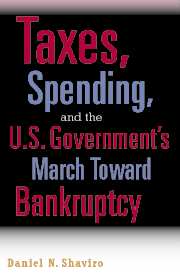Book contents
- Frontmatter
- Contents
- Acknowledgments
- Part 1 Labels and Consequences: The Failure of Our Fiscal Language
- Part 2 The Why and How of Long-Term Budgeting
- 4 What Are We Talking about When We Talk about Budget Deficits?
- 5 Long-Term Measures in Lieu of the Budget Deficit
- 6 Fiscal Gap Politics
- Part 3 Labels and Policies across Budget Categories
- Part 4 Conclusion
- Notes
- Bibliography
- Index
5 - Long-Term Measures in Lieu of the Budget Deficit
Published online by Cambridge University Press: 18 December 2009
- Frontmatter
- Contents
- Acknowledgments
- Part 1 Labels and Consequences: The Failure of Our Fiscal Language
- Part 2 The Why and How of Long-Term Budgeting
- 4 What Are We Talking about When We Talk about Budget Deficits?
- 5 Long-Term Measures in Lieu of the Budget Deficit
- 6 Fiscal Gap Politics
- Part 3 Labels and Policies across Budget Categories
- Part 4 Conclusion
- Notes
- Bibliography
- Index
Summary
He had bought a large map representing the sea,
Without the least vestige of land:
And the crew were much pleased when they found it to be
A map they could all understand.
“What's the good of Mercator's North Poles and Equators,
Tropics, Zones, and Meridian Lines?”
So the Bellman would cry: and the crew would reply
“They are merely conventional signs!
“Other maps are such shapes, with their islands and capes!
But we've got our brave Captain to thank”
(So the crew would protest) “that he's bought us the best -
A perfect and absolute blank!”
– Lewis Carroll, The Hunting of the SnarkIn Lewis Carroll's poem, the Bellman and his crew eventually find a Snark despite their scorn for “conventional signs.” But a political system cannot count on being so lucky. If long-term budgeting issues are important but deficits fail to illuminate them meaningfully, then alternative measures are needed.
This chapter therefore examines other possible measures for the four main issues raised by long-term budgeting. In making this inquiry, one should keep in mind the distinction between political salience and analytical merit. Some measures are easy to grasp but lack context and nuance. Others convey more information but could never inspire a newspaper headline. Both types are needed, although it is important not to confuse them.
The political and analytical realms differ not only in what sorts of measures are best, but also in how many can be used.
- Type
- Chapter
- Information
- Publisher: Cambridge University PressPrint publication year: 2006



